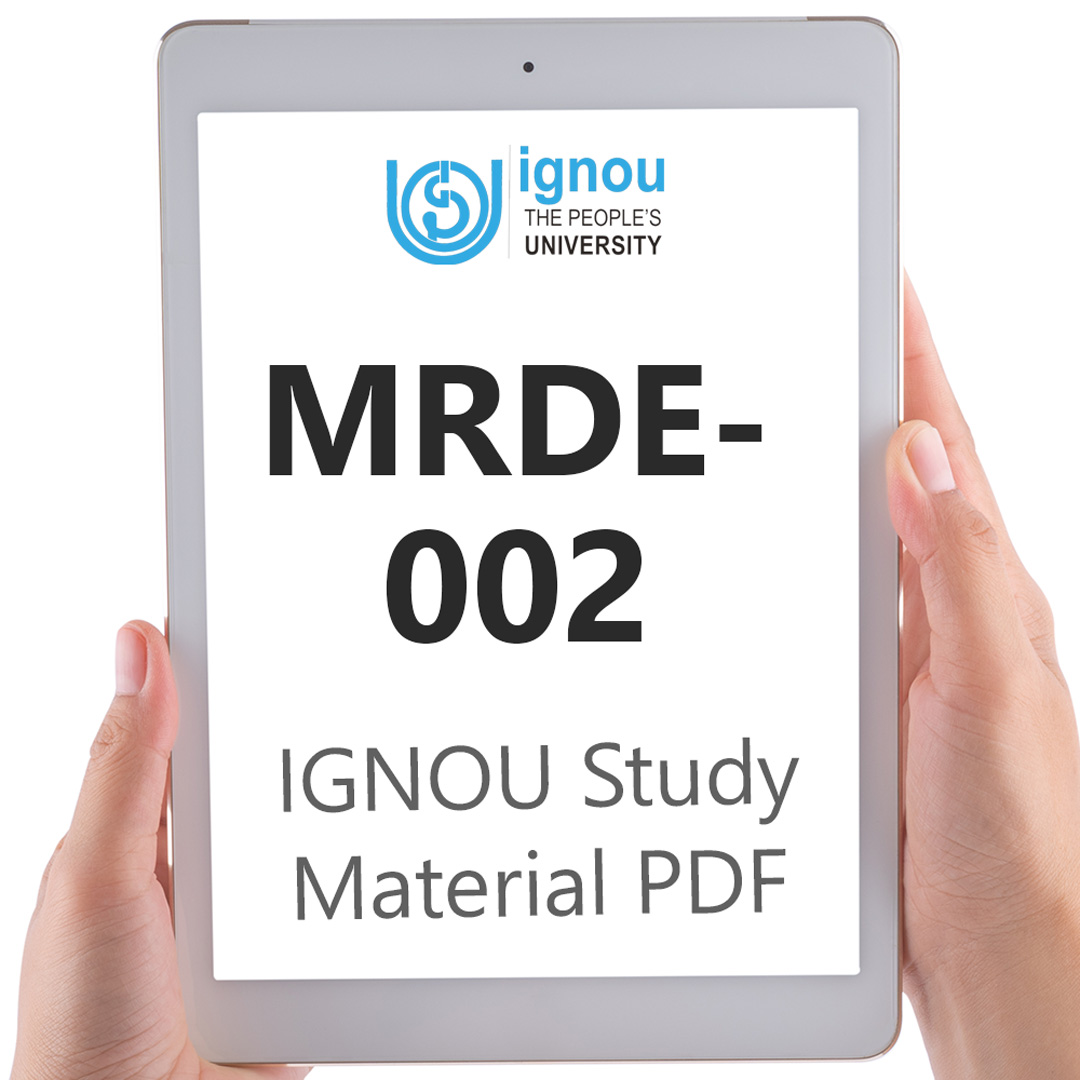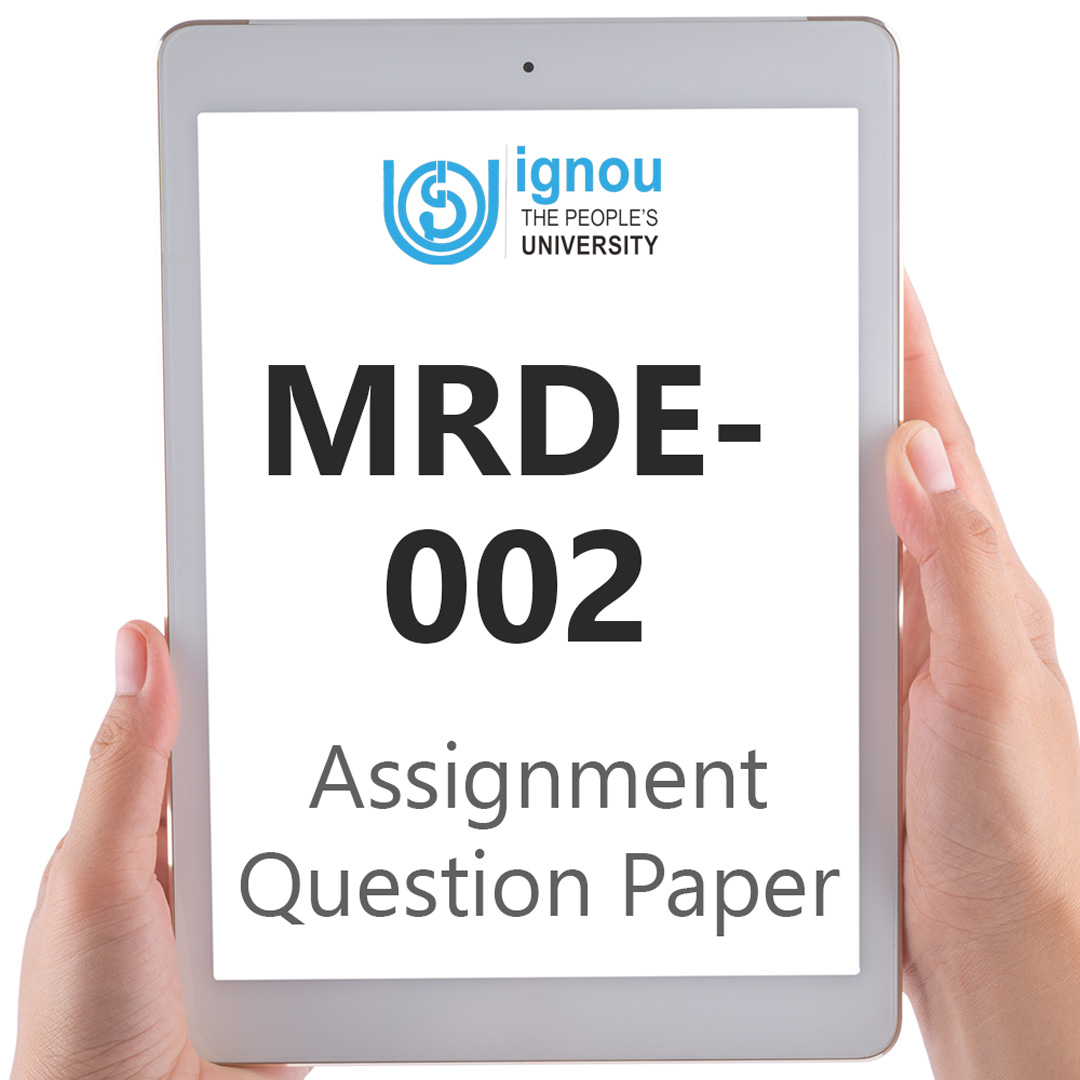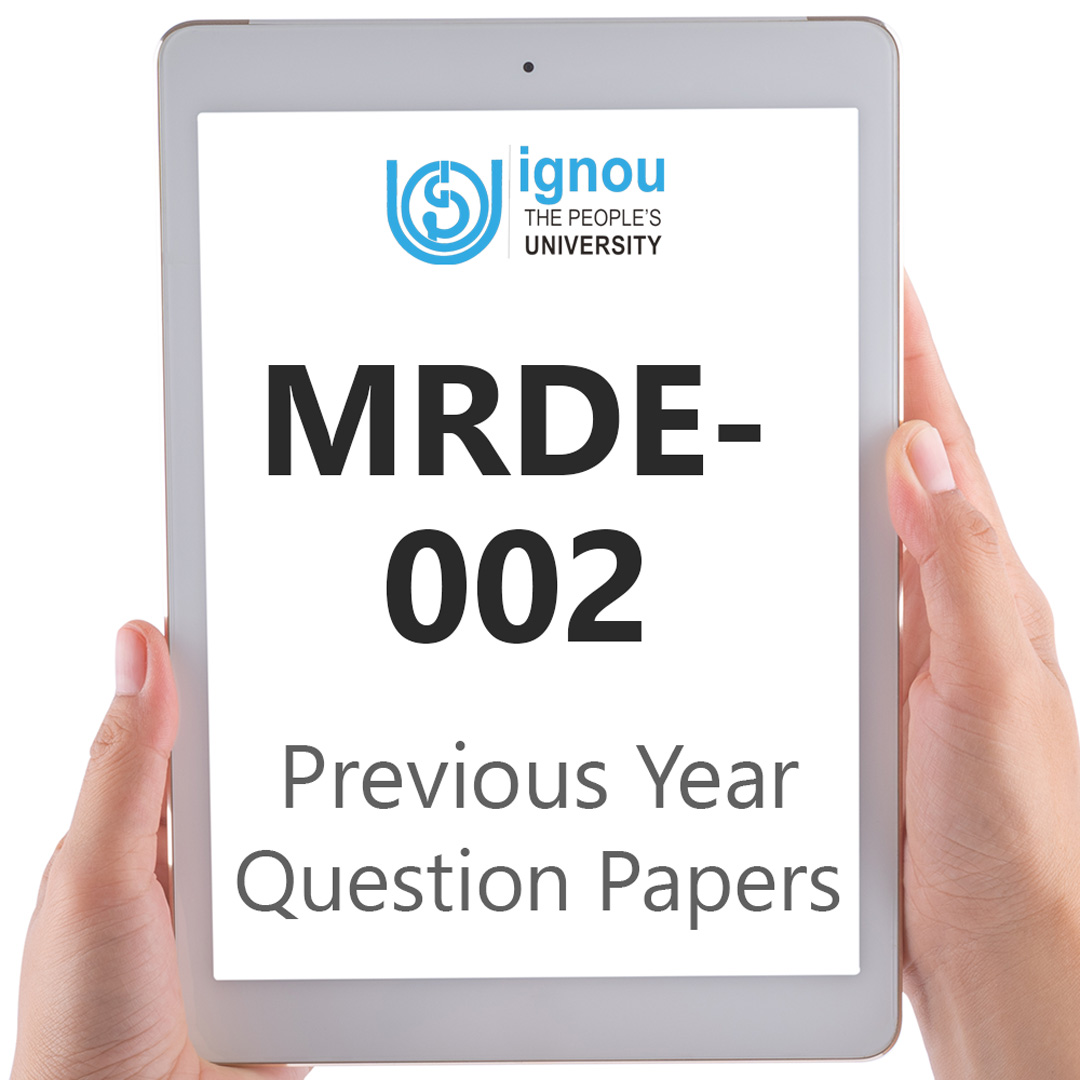If you are looking for MRDE-002 IGNOU Solved Assignment solution for the subject Voluntary Action in Rural Development, you have come to the right place. MRDE-002 solution on this page applies to 2022-23 session students studying in MARD courses of IGNOU.
MRDE-002 Solved Assignment Solution by Gyaniversity
Assignment Code: MRDE-002/TMA/2022-23
Course Code: MRDE-002
Assignment Name: Voluntary Action in Rural Development
Year: 2022-2023
Verification Status: Verified by Professor
Note: The assignment has three sections. It contains questions, which require long, medium and short answers. A long answer should not exceed 1000 words. Medium answers should not exceed 500 words each. Short answers should not exceed 100 words each.
Long Answers Questions
Attempt any One of the following:
Q1) Discuss the essential tenets of Voluntary Associations in a democratic society.
Ans)
Right to Freedom of Association: Freedom of association was acquired during Europe's democratic rights and freedoms evolution. In liberal democracies, freedom of association—the legal right of all individuals to combine or quit for a common cause—became customary. This basic prerequisite boosted modern voluntarism. Thus, modern democratic societies have many voluntary organisations. After Nazi Germany's horrors, the world agreed that the UN charter didn't clearly define "rights." Thus, a global statement of "rights of the individual" was needed. Thus, the UNGA adopted the "Universal Declaration of Human Rights" on December 10, 1948. Thirty articles follow the Preamble. The paper stresses most "individual rights," freedoms, and civil liberties in democratic societies' past Bills, Declarations, and Constitutions, with certain additions and elaborations. This unit is interested on Article 20's "freedom of association" clause. Everyone has the right to peaceful assembly and association. Nobody must join an organisation.
In order to defend human rights and fundamental freedoms, the "European Convention of Human Rights" reiterated "freedom of association":
Article 11: Assembly and Association
Article 11 safeguards the right to freedom of assembly and association, including the ability to form trade unions, subject to lawful and democratic constraints.
Genesis and Meaning of Voluntary Association: Society relies on communal effort. Individuals working toward a common objective or interest must cooperate. This implies "connection." Collective action and the need for individual association are not new. Since society's beginnings, "collective action"—groups of people working together—has existed. Association—new? what's with democracy, people now have freedom of association.
Only democratic societies allow people to legally join or leave groups to undertake particular responsibilities. Voluntariness comes from an individual's free will to join or leave an arrangement. Voluntarism denotes freedom to behave according to one's own volitions, preferences, and choices. Any voluntary association is based on freedom of association and voluntarism. Only democracy has provided the social, political, legal, and economic circumstances for freedom of association and voluntarism. Both of the above ideas support a "voluntary association," which is intrinsically related to democracy. Thus, liberal democratic societies now have a wide range of voluntary organisations.
Agricultural communities have various "common effort" activities in the past. During harvesting season, small farmers always have to work together. However, "reciprocity" was governed by community customs. The community considered these customs "obligations." Conventions and traditions imposed a mutually accepted necessity on associations. Entry or leave in such arrangements was not free will. By choosing out of a customary connection, a person risked their social and economic existence.
Guilds organised town commerce again. The "guild" formalised the shared interests of those in a particular trade or business activity. Birth, caste, occupation, or status determined entry into formal structures. Withdrawing again threatened a person's social and economic interests.
Historical associations of rural people for "collective action" or urban traders lacked two crucial elements: freedom of association and voluntarism. The participant could not leave an "association" without substantially hurting his/her social and economic interests.
The social philosophy of voluntarism and the right to "freedom of association"—embedded in "individual rights" and "basic freedoms" in a liberal democratic society—make modern voluntary associations possible. In a democracy, a person can join a group for collective action or leave it without affecting their own interests. In a democratic society, volunteers can join or leave voluntary associations based on "unconditional" altruism or reciprocity.
Modern Attributes of Collective-Action: Mediaeval society's collaborative activity was convention-governed and non-voluntarily cooperative. Tradition prescribed reciprocal relationships. Exiting a social arrangement had social and economic costs. Guilds organised city trade and commerce. When rural communities and city "guilds" disappeared, volunteer labour became necessary.
Commercial capitalism in Europe forced economic actors to cooperate because they couldn't cover all the contingencies. Mutual-benefit initiatives slowly supplanted conventions. Financial and informal aid supported such endeavours. Economic security was the main reason for joining such cooperatives. Despite rational decision independence, the "leave" was not cost-free.
Industrial production transformed the market and society. Market could not meet all individual needs formerly met by community. The working class lacked capital and resources to produce "collective products" or services. Capital-labour conflicts and their responses changed European social and moral standards. Renaissance-era Europe saw the rise of progressive, secural social thought, contemporary democratic ideals, and political awareness of rights and liberties.
The new social philosophy recognised that economic interest was not enough to maintain social order. Thus, people should focus on corn and unity. Modern voluntary groups based on voluntary labour emerged in the late nineteenth century and flourished in Europe in the twentieth century. You should now be able to connect these events with the parallel rise of democratic values and institutions in Europe. After the Welfare State was established in democratic nations, voluntary organisations diversified.
Social Ethos of Non-Profit: Modern voluntary organisations depend on the unpaid "volunteer" in a democratic society. Non-profits employ volunteers. Thus, a voluntary organisation can only exist if there is enough economic surplus for members to volunteer. Only a surplus economy can give society extra labour and time. Peasant communities require agricultural co-operation to survive. Democracy and capitalism made volunteering possible. Thus, voluntary groups' social "ethos of non-profit" is based on humane democratic ideals and can only survive in a democracy. Industrial capitalism transformed democratic economies due to various democratic struggles and demands.
The modern concept of volunteer as an independent and unpaid actor is the ideal and purest definition of volunteer. However, reality differs. Social and economic free will is rare despite metaphysical characteristics. Social controls affect individual behaviour. After weighing the pros and cons, a person decides to join a voluntary association.
Again, voluntary job payments are inconsistent. Volunteers work without remuneration. Some voluntary organisations pay modestly for tough or time-consuming activities. Like modern enterprises, major volunteer organisations use paid personnel, specialists, and professionals. However, bearing in mind the theoretical foundation of voluntarism, most agree that a voluntary organisation should endeavour to follow the social ethos of non-profit to retain its credibility and legitimacy in a democratic society.
Medium Answers Questions
Attempt any Two of the following:
Q1) Explain the objectives and guiding principles of Global Donor Platform for Rural Development (GDPRD).
Ans) The Global Donor Platform for Rural Development (GDPRD) is a group of international development organizations, donor agencies, and other groups that work together to promote sustainable rural development and reduce rural poverty. The GDPRD was set up in 2003 with the goal of getting development organizations to work together and coordinate more, so that their efforts are more aligned and effective.
Among the goals of the GDPRDL: Getting to the root causes of poverty and lack of development in rural areas and promoting and supporting sustainable rural development. Increasing the ability of rural communities to take part in development and have a say in the policies that affect their lives. Getting international development organizations and donor agencies to work together and coordinate better so that their efforts are aligned and more effective. Giving its members a place to talk about their experiences and what works best in rural development. Trying to get rural development added to national and international plans for development.
The GDPRD is based on the Principles: A commitment to the principles of sustainable rural development, such as reducing poverty, making sure there is enough food, and taking care of the environment. Getting people in the area involved and giving them power in the development process. Help to include rural development in national and international plans for development. A promise to be open and accountable about how resources are used and how programs are run. A promise that its members will share their experiences and best ideas with each other. In conclusion, the Global Donor Platform for Rural Development (GDPRD) is a network of international development organizations, donor agencies, and other stakeholders that work together to promote sustainable rural development and reduce poverty in rural areas. The GDPRD is based on the principles of sustainable rural development, local participation, openness and accountability, and the sharing of experiences and best practices.
Q2) Describe the contribution of Tarun Bharat Sangh (TBS) to watershed development in rural area.
Ans) Tarun Bharat Sangh (TBS) made an initial voluntary intervention related to watershed development in village Bheekampura, district Alwar, Rajasthan, in 1985. Situated in semi-arid region, the village suffered from acute shortage of water. Crops failed regularly, agriculture suffered, and lack of vegetation had resulted in soil degradation, in the areas. Rajender Singh, founder of the voluntary organisation Tarun Bharat Sangh (established in 1974) had basically moved to Bheekampura to spread literacy and fight against injustice to people. Destiny had something else in store for him.
A village resident, Mangulal Pate1 explained to Rajender Singh the pressing need for water in the village. Rajender Singh knew nothing about this dimension of water in rural areas. Mangulal explained to him the significance and value of traditional water reservoirs (Johads) as a source of water. A Johad is essentially an artificially created reservoir for catching rainwater. A concave shaped barriers is built with mud and rubble across a slop to arrest rainwater. High embankments are built on three sides while leaving one side for the rainwater to enter the reservoir.
The water collected in a johad during monsoon season, can be utilized for irrigation, drinking and other domestic purposes in the village. A number of johads have the potential to improve moisture in the sub-soil and recharge ground water and wells in an area. A distinctive feature of 'Johad' is that its construction involves simple technology and inexpensive locally available resources i.e., labour and material. The experience and intuition of villagers is sufficient for designing and building of such water harvesting reservoirs.
Heeding the advice of Mangulal, Rajender Singh made up his mind to build 'Johads' in the area surrounding Bheekampura. He motivated the local communities and sought their active participation and contribution for building water harvesting structures. It took three years’ time for Tarun Bharat Sangh to build the first 'johad'. However, in the fourth year Tarun Bharat Sangh, with the participation of local communities, was able to build 50 johads. There was no looking back. In the fifth year, the number reached 100 johads and by 2001, it became 1000 johads. In total Tmn Bharat Sangh has facilitated the construction of more than 5000 water harvesting structures in about 1058 villages.
Short Answers Questions
Attempt any Five of the following:
Q1) Barefoot College
Ans) Barefoot College is a non-governmental organization (NGO) based in India that works with rural communities to teach them how to develop in a way that is sustainable. The organization teaches women how to become "barefoot professionals" in fields like solar engineering, water management, and health care. Its approach is based on the ideas that solutions should be simple, low-cost, and long-lasting, and that the community should be involved and take part.
Q2) Voluntary Action Cell
Ans) Voluntary Action Cell (VAC) is a place where volunteer work in a certain area or community can be coordinated, promoted, and grown. It acts as a link between the government, NGOs, and the general public, and it helps a certain area grow in a way that is both effective and sustainable. VAC's main goals are to encourage people to take action on their own, give people a place to coordinate and work together, offer technical and financial support, raise awareness, and track and evaluate how programs and initiatives are working.
Q3) Main Characteristics of Unregistered VOs
Ans) Unregistered Voluntary Organizations (VOs) are groups that are not officially registered with the government and do not have the legal recognition and benefits that come with registration. Even so, unregistered VOs are very important in many places and fields, especially in developing countries. They are informal, have limited resources, are run by volunteers, and are not recognized by the law.
Q4) NGO-Typology based on Tasks.
Ans) NGO Typology based on Tasks is a way to group NGOs based on the kind of work they do, not on how they are set up or how they get their money. Service delivery NGOs, advocacy NGOs, capacity building NGOs, networking NGOs, and research and monitoring NGOs are the main types of NGOs in this typology. Each type of NGO plays a different role in development, and they often work together to reach the same goals.
Q5) Networking and Alliance Building among Voluntary Organization
Ans) Networking and alliance building among voluntary organizations (VOs) is the process of building relationships, partnerships, and collaborations between organizations that have similar goals and objectives. This can be done by making formal or informal plans to share information, resources, and expertise, as well as by working together to lobby for change. VOs can use this to improve their advocacy efforts by getting a larger and more diverse group of organizations to speak out on specific issues.





